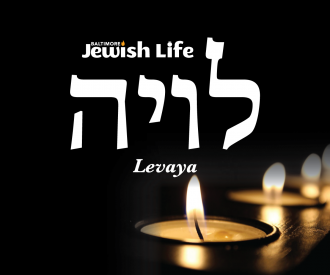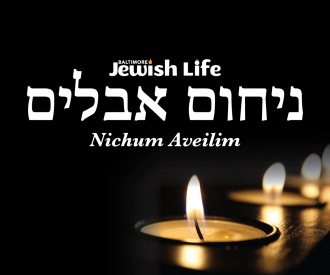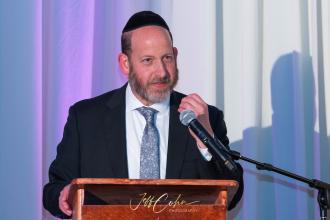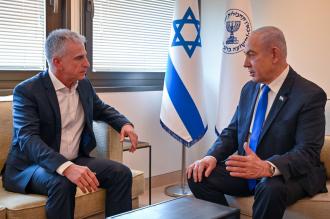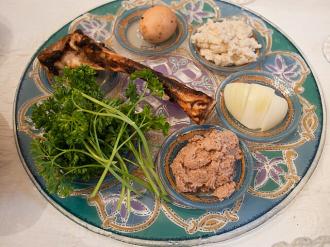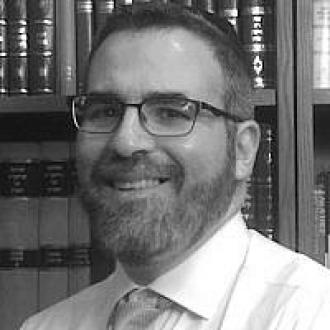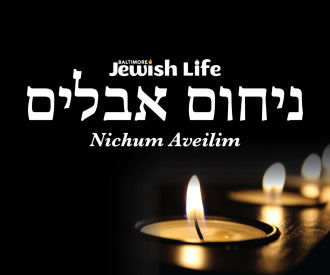On Friday night our prayers focus on that very first Shabbos, the seventh day of creation, reflecting on the benevolence of G-d who gifted us this world, avowing that He is the One who is the source of all our blessing.
On Shabbos day we reaffirm in our prayers, that second most noteworthy Shabbos, the day of the week we were privileged to exclusively receive the Torah at Sinai, committing to preserving this treasure.
On Shabbos afternoon we align our observance of Shabbos in the context of that greater Shabbos, the World to Come, ‘a day that is completely Shabbos’, appreciating our destiny as the ‘one’ nation, whose role is to represent His ‘Oneness’ in the world.
It is only in this third prayer that the imagery of the patriarchs is evoked where it describes, אברהם יגל יצחק ירנן יעקב ובניו ינוחו בו, Avraham would rejoice, Yitzchok would exult, Yaakov and his children would rest in it.
Why are we referencing the patriarchs specifically here and what is the significance to their ‘rejoicing’ and ‘exulting’?
The Torah reports later in Yitzchok’s life, that his eyes dimmed from seeing.
The Midrash describes how when Yitzchok lay bound on the altar at the Akeidah, the ministering angels wept over him and their tears fell into his eyes, leaving an impression.
(ב"ר סה י)
Elsewhere the Midrash states that it was the tears of his father Avrohom, as he took the knife to slaughter him, that descended into Yitzchok’s eyes, blinding him. (שם נו ה)
Why didn’t G-d heal them?
Nor do we find that Yitzchok prayed for a cure. Why not?
Rashi in Sefer Hapardes interprets the words in the Mincha prayer that speak of Avrohom’s rejoicing as referring to a verse in Proverbs, The father of a righteous son will rejoice greatly, and who begets a wise son will have joy with him. (משלי כג כד)
Rashi adds, the exulting of Yitzchok, יצחק ירנן, alludes to a verse in Psalms, רננו צדיקים..., Sing joyfully, O righteous, because of G-d. (תהלים לג א)
Quoting the Midrash he explains that whenever one observes the Divine Presence it is a cause for song. Since Yitzchok viewed the Shechinah above him at the Akeidah, he broke out in song.
Perhaps the message being conveyed here is that only when a father pines for, and rejoices in, the righteousness of his son can he succeed in assuring his legacy will continue.
Only when a father exults in song, even while the glint of the knife that is to slaughter him is reflected in his eyes, can he assure that, Yaakov and his children would rest in it, that his children will be inspired to follow in his ways.
A father in Israel who had returned to observance begged his son, a soccer star, to follow his path. The son responded compassionately that although he respected his father’s choice, but his livelihood and career depended on playing on Shabbos, and it was simply impossible. The father tearfully pleaded with his son to at least join him for the prayers on Rosh Hashana, when no games are scheduled. He respectfully consented. After the holiday his son approached him and said, "Abba ani chozer!", “Father I am returning”. Stunned, his father inquired as to what made him change heart so quickly. He said that he didn’t quite comprehend it himself but somehow the sound of the Shofar penetrated his heart.
The great Nesivos Shalom, the Slonimer Rebbe zt’l, overwhelmed with emotion, broke down in tears when hearing this story. He explained that it was the powerful tears of a father, yearning for a righteous son, that were amplified in the sound of the Shofar, the proverbial cry from our Father in heaven warmly summoning His child home, that worked its magic.(HaMevaser Erev RH)
Yitzchok cherished those tears that his father cried, knowing that it was his father’s expression of love and hope for him, that strengthened and enabled him to bravely face the blade of the knife in fulfilling G-d’s will. He gladly accepted the impression of those tears embedding it within the soul of his future progeny for posterity.
In 2002, Rav Oren Levi, a young kollel man, married with a half year old son, and involved in kiruv, managed a guesthouse in the heart of the Bais Yisroel neighborhood. The guesthouse was part of a Yeshiva that hosted families who had returned to observance and were celebrating life cycle simchos who wanted to invite their uncommitted wider family members, giving them an opportunity to see religious life in action. There were tours and visits to popular places and personalities who made a strong impact on the visitors, often bringing them back to observance.
Oren was very charming and engaging and quickly captured the hearts of the guests.
On one particular Shabbos, a guest, a very secular Jew who together with his wife and two children came to celebrate a family simcha with his religious sister, pulled up fifteen minutes before candle lighting. He took one look at the neighborhood and the nature of its inhabitants and quickly declared this is not what he signed up for and was turning around and heading home. Yaron appealed with him to stay trying to convince him that he would have a great time, begging him not to let his sister down. The fellow refused. As he was about to pull away Oren jumped into the passenger side of the vehicle and stated that he was joining him in his ride home. Oren quietly prayed to G-d to assist him in winning his guest over. His determined charm won out as the family succumbed and stayed for Shabbos.
It was a glorious Shabbos that went beyond all expectations, visiting the great mekubal Rav Kaduri and the Slonimer Rebbe, and participating in many inspiring programs.
As Shabbos waned the guests returned to pack up and check-out with Oren at the front desk.
And then all hell broke out. A terrorist set off a twenty kilogram bomb a short distance from the building. Ten people died, sixty were wounded. Among the dead were the two children of the reluctant family that had just experienced their very first Shabbos of their lives.
Oren had providentially just bent over his desk to fetch something as the bomb detonated. Although injured, he survived. Chaos erupted with every family searching for their loved ones. Oren ended up in the hospital reuniting with his wife and infant son who were thrown by the blast but were safe. He recalls how the reporters were interviewing a woman identified as Savta Chana, who lost eight members of her family, who were celebrating the Bar Mitzva of her grandson, being asked what she has to say to G-d in light of the tragedy. Without hesitating she responded the she would like to report to Him that although the legendary Chana gave up her seven sons to die Al Kiddush Hashem, she, Chana from Rishon L’Tzion surrendered eight!
Three days later Oren was released from the hospital and decided that despite the difficulty, he would go to offer condolences to the couple who had lost their two and only children. He prayed that G-d put into his mouth the right words. As he arrived at their home, he observed a great Rav that came to be menachem avel, overhearing the bereaved father bemoan, as he held the pillow of his deceased son, that this is all that remains from him. Cries erupted as he questioned aloud how it could be that after keeping his very first Shabbos, this is the reward G-d gave him.
The Rav spoke up and warmly explained that a person’s time to die is predestined from Rosh Hashana. The children could have just as well died while sitting on the beach. But G-d lovingly granted them the privilege to depart from this world suffused with the sanctity of Shabbos instead, as they ascended on high.
At that moment Oren was noticed and someone announced there was a special visitor from Jerusalem. He wanted to be swallowed up by the ground at that very moment. Yet, the bereaved father stood up from his place embracing him with a loving hug and kiss. Oren said he simply didn’t know what to say, with his new friend responding he already understands it all. The father went onto retell how his young son was already safely in the car and shielded and his young daughter was on the fourth floor, yet the shrapnel found its ‘improbable’ mark, nevertheless. It was clearly the hand of G-d.
The family returned to their faith and were blessed with a son eleven months later and a daughter the following year. (Hebrew Mishpacha 4 Tishrei 5780)
The angels cried when they observed how a mortal Yitzchok, whose sight is bound by the limitations of his physical being, transcend beyond the levels of devotion of ministering angels, singing a tribute of thanks to the Divine Presence, able to perceive the joy of the moment through the thickest of clouds. Those tears fell and dimmed Yitzchoks’s eyes, leaving a lasting impression for all of his descendants, so that they too would emulate his greatness, in praising the Almighty even amidst the most trying of times, even when it seemed so dark.
Shabbos is the reset button on our week. It is when we refocus our vision, with our eyes closed to the delusions of a material world. It is a time when we put all else aside and sing a true and beautiful song of Shabbos, of a world that is completely and genuinely Shabbos.
באהבה,
א גוט שבת,
שבת שלום,
צבי יהודה טייכמאן

